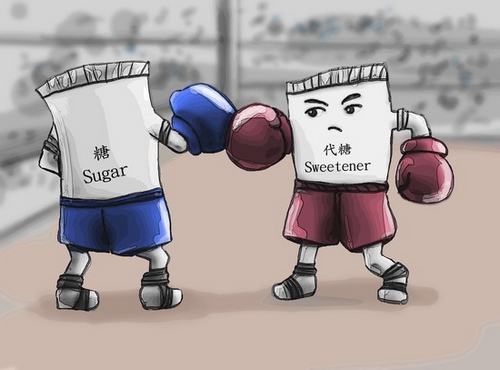
Food Safety Focus (107th Issue, June 2015) – Food Safety Platform
Role of Sweeteners in Reduction of Sugar Intake (Part II)
Reported by Ms. Joey KWOK, Scientific Officer,
Risk Assessment Section,
Centre for Food Safety
In the last issue, we have discussed about the role of low-calorie sweeteners replacing some of the added sugar in our diet and its implications for weight control. In this issue, let us look into how our bodies respond to sweet taste, and the concerns on the use of low-calorie sweeteners among children.
Response to Sweetness
Have you ever noticed when newborn infants taste something sweet, their faces relax and they give a broad smile? According to scientists, our sensory system has evolved to detect and prefer foods that are energy-rich and taste sweet. Sugar (e.g. sucrose, fructose, glucose) and low-calorie sweeteners (e.g. aspartame, sucralose, neotame) interact with our taste receptor cells. This in turn elicits sweet taste and activates the pleasure-generating brain circuitry.
Preference for Sweetness
Across many countries and cultures, children have shown to like higher intensities of sweet taste than do adults. Research findings also suggest that early exposure to sugar-sweetened items led to an increased preference for sweetened items as well as an increased preference for higher levels of sugar in food.
Concerns on the Use of Low-calorie Sweeteners among Children
As children are at an earlier stage in developing taste preferences, some researchers are concerned that the use of low-calorie sweeteners among children may have some influence on such developing process.
Other concerns on the use of low-calorie sweeteners among children include whether or not their diet quality and oral health will be adversely affected by the consumption of food and beverages containing these sweeteners.
Intake of sweet drinks, whether they are sweetened with sugar or low-calorie sweeteners, may reduce the quality of children's diet by replacing the more nutritious drinks in the diet, such as milk. The acidity of carbonated drinks, whether they are sweetened with sugar or low-calorie sweeteners, and the frequent consumption of them, may contribute to tooth erosion.

Sugar versus Sweetener
Are Low-calorie Sweeteners "Suitable" Candidates for Sugar Replacement?
It appears that consensus regarding recommendation on replacing sugar with low-calorie sweeteners is yet to be reached among different authoritative bodies.
In the United Kingdom, the National Institute for Health and Care Excellence advises in the guideline Maintaining a Healthy Weight and Preventing Excess Weight Gain among Adults and Children (2015) that everyone should be encouraged to choose water or other drinks that do not contain free sugars. Other suitable drinks may include coffee, tea or drinks containing low-calorie sweeteners, such as "diet" versions of carbonated drinks or squashes. Furthermore, in the document entitled Sugar Reduction: Responding to the Challenge (2014) published by Public Health England, it has been put forward to the food industry for consideration that, where reformulation is possible it could include the replacement of sugars with sweeteners and the gradual lowering of levels of both sugar and sweeteners. The latter would have the advantage of allowing tastes to adapt to a lower level of sweetness.
On the contrary, in the United States, the 2015 Dietary Guidelines Advisory Committee has stated in its Scientific Report that added sugar should be reduced in the diet and not replaced with low-calorie sweeteners, but rather with healthy options, such as water in place of sugar-sweetened drinks.
Advice to the Trade
- Reformulate products with less sugar/sweetener.
- Replacing sugar with low-calorie sweeteners could be considered an option to lower sugar content in certain products (e.g. sugar-sweetened drinks).
Advice to the Public
- Reduce the amount of sugar/sweetener added to food and drinks at the table.
- On occasion that sweet-tasting food or beverage is to be consumed, sugar-free products or products containing low-calorie sweeteners could be considered an option.


